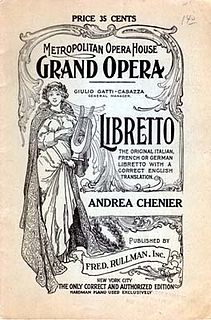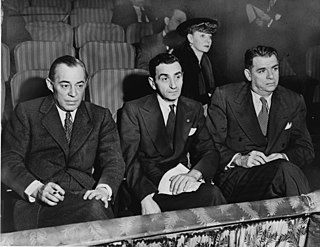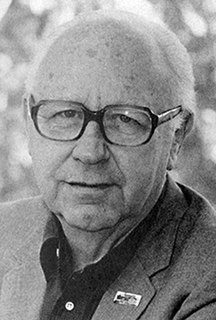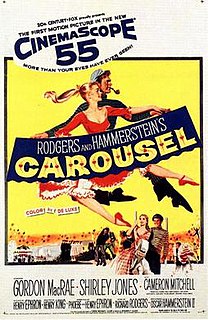Related Research Articles

Carousel is the second musical by the team of Richard Rodgers (music) and Oscar Hammerstein II. The 1945 work was adapted from Ferenc Molnár's 1909 play Liliom, transplanting its Budapest setting to the Maine coastline. The story revolves around carousel barker Billy Bigelow, whose romance with millworker Julie Jordan comes at the price of both their jobs. He participates in a robbery to provide for Julie and their unborn child; after it goes tragically wrong, he is given a chance to make things right. A secondary plot line deals with millworker Carrie Pipperidge and her romance with ambitious fisherman Enoch Snow. The show includes the well-known songs "If I Loved You", "June Is Bustin' Out All Over" and "You'll Never Walk Alone". Richard Rodgers later wrote that Carousel was his favorite of all his musicals.

Oscar Greeley Clendenning Hammerstein II was an American lyricist, librettist, theatrical producer, and director in the musical theater for almost 40 years. He won eight Tony Awards and two Academy Awards for Best Original Song. Many of his songs are standard repertoire for vocalists and jazz musicians. He co-wrote 850 songs.

A libretto is the text used in, or intended for, an extended musical work such as an opera, operetta, masque, oratorio, cantata or musical. The term libretto is also sometimes used to refer to the text of major liturgical works, such as the Mass, requiem and sacred cantata, or the story line of a ballet.

Richard Charles Rodgers was an American composer, known largely for his work in musical theater. With 43 Broadway musicals and over 900 songs to his credit, Rodgers was one of the most significant American composers of the 20th century, and his compositions had a significant influence on popular music.

Rodgers and Hammerstein refers to the theatre-writing team of composer Richard Rodgers (1902–1979) and lyricist-dramatist Oscar Hammerstein II (1895–1960), who together created a series of innovative and influential American musicals. Their popular Broadway productions in the 1940s and 1950s initiated what is considered the "golden age" of musical theatre. Five of their Broadway shows, Oklahoma!, Carousel, South Pacific, The King and I and The Sound of Music, were outstanding successes, as was the television broadcast of Cinderella (1957). Of the other four shows that the team produced on Broadway during their lifetimes, Flower Drum Song was well-received, and none was an outright flop. Most of their shows have received frequent revivals around the world, both professional and amateur. Among the many accolades their shows garnered were thirty-four Tony Awards, fifteen Academy Awards, two Pulitzer Prizes and two Grammy Awards.

Alfred Newman was an American composer, arranger, and conductor of film music. From his start as a music prodigy, he came to be regarded as a respected figure in the history of film music. He won nine Academy Awards and was nominated 45 times, contributing to the extended Newman family being the most Academy Award-nominated family, with a collective 92 nominations in various music categories.

Robert Russell Bennett was an American composer and arranger, best known for his orchestration of many well-known Broadway and Hollywood musicals by other composers such as Irving Berlin, George Gershwin, Jerome Kern, Cole Porter, and Richard Rodgers.

David Raksin was an American composer who was noted for his work in film and television. With over 100 film scores and 300 television scores to his credit, he became known as the "Grandfather of Film Music."

The Goldwyn Follies is a 1938 Technicolor film written by Ben Hecht, Sid Kuller, Sam Perrin and Arthur Phillips, with music by George Gershwin, Vernon Duke, and Ray Golden, and lyrics by Ira Gershwin and Sid Kuller. Some sources credit Kurt Weill as one of the composers, but this is apparently incorrect. The Goldwyn Follies was the first Technicolor film produced by Samuel Goldwyn.

A show tune is a song originally written as part of the score of a work of musical theatre, musical film or a TV show, especially if the piece in question has become a standard, more or less detached in most people's minds from the original context.

John Waldo Green was an American songwriter, composer, musical arranger, conductor and pianist. He was given the nickname "Beulah" by colleague Conrad Salinger. His most famous song was one of his earliest, "Body and Soul" from the revue Three's a Crowd. Green won four Academy Awards for his film scores and a fifth for producing a short musical film, and he was inducted into the Songwriters Hall of Fame in 1972. He was also honored with a star on the Hollywood Walk of Fame.
Conrad Salinger was an American arranger, orchestrator and composer, who studied classical composition at the Paris Conservatoire. He is credited with orchestrating nine productions on Broadway from 1931 to 1938, and over seventy-five motion pictures from 1931 to 1962. Film scholar Clive Hirschhorn considers him the finest orchestrator ever to work in the movies. Early in his career, film composer John Williams spent much time around Salinger.
The Film Music Society is an international non-profit organization supporting the preservation of music from motion pictures and television programs.

Carousel is a 1956 American drama fantasy musical film based on the 1945 Rodgers and Hammerstein stage musical of the same name, which in turn was based on Ferenc Molnár's 1909 non-musical play Liliom. The film stars Gordon MacRae and Shirley Jones, and was directed by Henry King. Like the original stage production, the film contains what many critics consider some of Rodgers and Hammerstein's most beautiful songs, as well as what may be, along with the plots of Allegro, South Pacific, and The King and I, the most serious storyline found in their musicals.
Carousel is a ballet made by New York City Ballet resident choreographer Christopher Wheeldon to the music of Carousel Waltz and If I Loved You (1945) by Richard Rodgers, arranged and orchestrated by William David Brohn. The music used in the ballet is from Rodgers and Hammerstein's classic 1945 musical Carousel. The premiere took place Tuesday, 26 November 2002, at the New York State Theater, Lincoln Center.
John Wilson is a British conductor, arranger and musicologist, who conducts orchestras and operas, as well as big band jazz. He is the creator of the John Wilson Orchestra and Associate Guest Conductor of the BBC Scottish Symphony Orchestra.
The John Wilson Orchestra was formed by British orchestral conductor John Wilson in 1994. It is a symphony orchestra that includes a jazz big band. It performs the original arrangements of MGM musicals and the works of Rodgers and Hammerstein. The orchestra has performed annually in The Proms summer festival since 2009.
Gertrud Rittmann was a German Jewish composer, musical director, arranger and orchestrator who lived and worked for much of her life in the United States. Her career particularly flourished with major successes in Broadway theater.
Douglas Besterman is an American orchestrator, musical arranger and music producer. He is the recipient of three Tony Awards out of six total nominations and two Drama Desk Awards out of six total nominations, and was a 2009 Grammy Award nominee.
Daniel Troob is an American arranger and orchestrator best known for his contributions to the Disney blockbusters of the 1990s & 2000s. He won Drama Desk awards for Big River (1985) and Rodgers & Hammersteins' "Cinderella" (2013).
References
- ↑ Oscar Levant, A Smattering of Ignorance, Garden City Publishing, 1942, p.108 after Rosar 2002 editorial.
- ↑ Ian Sapiro, Scoring the Score: The Role of the Orchestrator in Contemporary Film Industry, Routledge, 2016.
- ↑ John Mangum, Heaven Effect and Waltz from “Carousel” (Richard Rodgers annotation) https://www.laphil.com/musicdb/pieces/1926/heaven-effect-and-waltz-from-carousel
- ↑ Stephen Suskin, The Sound of Broadway Music: A Book of Orchestrators and Orchestrations, 2011, p.24.
- ↑ Edward Powell entry IBDB.com
- ↑ Letter to the Editor, The Musical Quarterly, Oxford Academic https://academic.oup.com/mq/article-abstract/80/1/182/1306164
- ↑ David Raksin & C.M. Berg, Music Composed by Charles Chaplin: Auteur or Collaborateur? Journal of the University Film Association, 1979.
- ↑ Edward Jablonski, Gershwin: a biography, Doubleday, NY, 1987, p.315
- ↑ Edward Powell entry, Discogs bio, Discography & Songs https://www.discogs.com/artist/2188370-Edward-Powell
- ↑ Levant p.122 after Rosar editorial p.3 n.19.
- ↑ Powell unpublished interview with Rosar, 29 January 1977, cited in Rosar p.4, n.19.
- ↑ Roland Jackson, The Vision Scenes in Bernadette: Newman’s and Powell’s Contributions, Journal of Film Music 3.2 (2011) p.111.
- ↑ Maurizio Caschetto, audio file interview with David Newman, April–May 2019, Legacy Conversations, available: www.thelegacyofjohnwilliams.com
- ↑ Roger L. Hall, In Love and War, Film Music Review, 2007, available https://hugofriedhofer.dudaone.com/in-love-and-war
- ↑ Mark Valencia, Review of Rodgers & Hammerstein at the Movies – The John Wilson Orchestra with Joyce DiDonato, Maria Ewing and Julian Ovenden [EMI], 2013, available https://classicalsource.com/db_control/db_cd_review.php?id=10694
- ↑ Powell interview by Fred Steiner, transcript, pp.5-6 quoted in William H. Rosar, Editorial Essay, Journal of Film Music, Vol.2, Nos.2-4, Winter 2009, p.115.